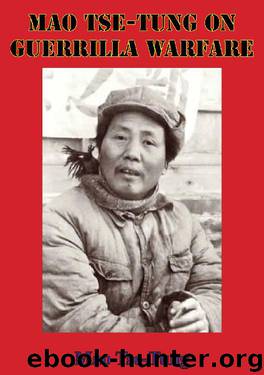Mao Tse-Tung On Guerrilla Warfare by Mao Tse-tung

Author:Mao Tse-tung [Tse-Tung, Mao]
Language: eng
Format: epub
Publisher: Hauraki Publishing
Published: 2015-11-06T00:00:00+00:00
4 — CAN VICTORY BE ATTAINED BY GUERRILLA OPERATIONS?
Guerrilla hostilities are but one phase of the war of resistance against Japan and the answer to the question of whether or not they can produce ultimate victory can be given only after investigation and comparison of all elements of our own strength with those of the enemy. The particulars of such a comparison are several. First, the strong Japanese bandit nation is an absolute monarchy. During the course of her invasion of China, she had made comparative progress in the techniques of industrial production and in the development of excellence and skill in her army, navy, and air force. But in spite of this industrial progress, she remains an absolute monarchy of inferior physical endowments. Her manpower, her raw materials, and her financial resources are all inadequate and insufficient to maintain her in protracted warfare or to meet the situation presented by a war prosecuted over a vast area. Added to this is the anti-war feeling now manifested by the Japanese people, a feeling that is shared by the junior officers and, more extensively, by the soldiers of the invading army. Furthermore, China is not Japan’s only enemy. Japan is unable to employ her entire strength in the attack on China; she cannot, at most, spare more than a million men for this purpose, as she must hold any in excess of that number for use against other possible opponents. Because of these important primary considerations, the invading Japanese bandits can hope neither to be victorious in a protracted struggle nor to conquer a vast area. Their strategy must be one of lightning war and speedy decision. If we can hold out for three or more years, it will be most difficult for Japan to bear up under the strain.
In the war, the Japanese brigands must depend upon lines of communication linking the principal cities as routes for the transport of war materials. The most important considerations for her are that her rear be stable and peaceful and that her lines of communication be intact. It is not to her advantage to wage war over a vast area with disrupted lines of communication. She cannot disperse her strength and fight in a number of places, and her greatest fears are thus eruptions in her rear and disruption of her lines of communication. If she can maintain communications, she will be able at will to concentrate powerful forces speedily at strategic points to engage our organized units in decisive battle. Another important Japanese objective is to profit from the industries, finances, and manpower in captured areas and with them to augment her own insufficient strength. Certainly, it is not to her advantage to forgo these benefits, nor to be forced to dissipate her energies in a type of warfare in which the gains will not compensate for the losses. It is for these reasons that guerrilla warfare conducted in each bit of conquered territory over a wide area will be a heavy blow struck at the Japanese bandits.
Download
This site does not store any files on its server. We only index and link to content provided by other sites. Please contact the content providers to delete copyright contents if any and email us, we'll remove relevant links or contents immediately.
| Anarchism | Communism & Socialism |
| Conservatism & Liberalism | Democracy |
| Fascism | Libertarianism |
| Nationalism | Radicalism |
| Utopian |
The Secret History by Donna Tartt(19052)
The Social Justice Warrior Handbook by Lisa De Pasquale(12187)
Thirteen Reasons Why by Jay Asher(8893)
This Is How You Lose Her by Junot Diaz(6877)
Weapons of Math Destruction by Cathy O'Neil(6264)
Zero to One by Peter Thiel(5786)
Beartown by Fredrik Backman(5737)
The Myth of the Strong Leader by Archie Brown(5499)
The Fire Next Time by James Baldwin(5431)
How Democracies Die by Steven Levitsky & Daniel Ziblatt(5215)
Promise Me, Dad by Joe Biden(5141)
Stone's Rules by Roger Stone(5081)
A Higher Loyalty: Truth, Lies, and Leadership by James Comey(4954)
100 Deadly Skills by Clint Emerson(4921)
Rise and Kill First by Ronen Bergman(4779)
Secrecy World by Jake Bernstein(4741)
The David Icke Guide to the Global Conspiracy (and how to end it) by David Icke(4701)
The Farm by Tom Rob Smith(4502)
The Doomsday Machine by Daniel Ellsberg(4484)
